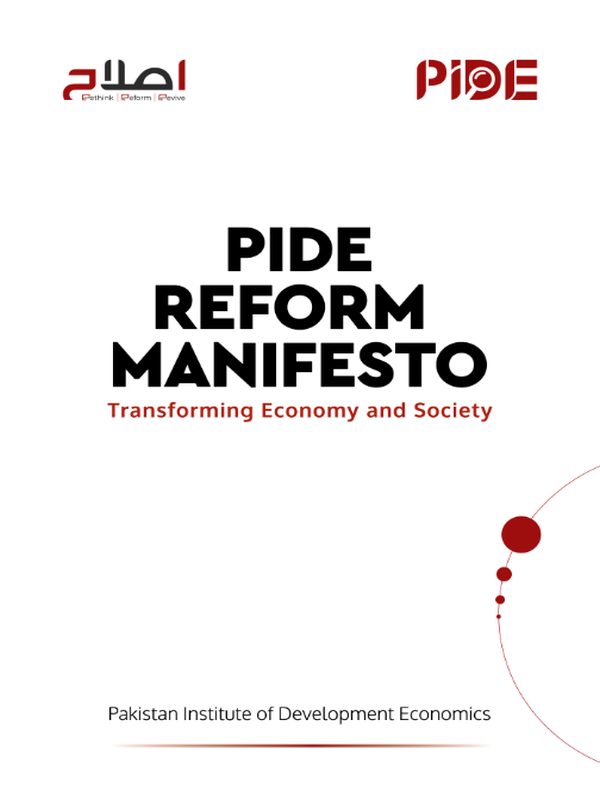PIDE Reform Manifesto: Transforming Economy and Society
FOREWORD
A growing and modern Pakistan!
End being a perpetual patient of the global emergency ward!
The economic mess in Pakistan continues. Twenty-four IMF programs later, the economy remains close to default, without investment, and under fear of continued current account and fiscal deficits.
Reflecting the level of confidence in the country, investment remains exceptionally low, almost negligible. Only the informal market works to provide investment, employment, and other economic opportunities!
The formal market is heavily as well as unintelligently regulated. PIDE estimates that the footprint of the government is as much as 64 percent because of the excessive interference by the colonial bureaucracy through controls on market entry and development.
PIDE also estimates that the cost of this permission culture and extensive regulation may amount to as much as 45 percent of GDP. Looked at this way, there is little room to invest in the economy.
Continuing the colonial tradition, the unreformed, Government that we have preserved during our 75 years of independence remains extremely suspicious of wealth-making.
A spoils system
The democratic system has evolved around the colonial mandate of civilizing the natives and patrimonialism. The result is that votes are given not based on ideologies or ideas, but on expected giveaways, as well as the provision of rights through official largesse! This immature democracy regards elections only as gaining unchecked power to control the country’s resources. The waste of this imperial democracy has led to unsustainable levels of debt.
The continued colonial system also impedes modernizing society while also retaining a deep suspicion of markets! Inheritors of the colonial system continue to expand the colonial lifestyle at a huge cost to the budget. City centers, often the crucible of investment and innovation, are occupied by offices and housing for the officials and judges. Bureaucrats run city development and regulation to their benefit.
Cities are forced by regulations to suit officials’ downtown occupation to push population and high-rise buildings out of the city. The resulting sprawl has caused unlivable pollution in almost all cities.
Public investment (via PSDP) has been politicized. All politicians push their projects in their constituencies without economic analysis. Not only has this led to waste, but it has also confused local politics with national politics, with MNA, MPAs, and even ministers and chief ministers behaving as local councilors. Besides, these projects have become a part of patronage politics. We need ideological politics, not patronage politics.
Local government is resisted by the VIPs: politicians to preserve their PSDP funds, and bureaucrats to preserve control of cities and land development. Without local government, democracy remains incomplete.
Lacking policy and reform capacity
In short, officialdom preys upon transactions and markets. Colonial structures have been captured by various mafias and have lost the ability to be an independent operator of claims!
As Pakistan lurches, from one crisis to another, the ruling and controlling colonial structures remain talent-repellent. Innovative, entrepreneurial, and research skills have no opportunity here and are forced to leave. The colonial structures are further reinforced as they have no challenge to their authority. However, this also means antiquated institutions cannot deal with the 21st century global economic environment.
The huge aid/lending institutions, pretend as if Pakistan is a modernized economy. They merely add burdens onto the 19th century, colonial structure. Loans are too easily given. Organic thought and research remain stunted as international consultants allow no room for research.
This is a recipe for disaster. This explains why for the last 75 years Pakistan has been lurching from crisis to crisis and is now considered to be a candidate for default in the global marketplace!
The future is reform!
There still is hope. Pakistan has a young population that is scrambling to get out of the country to escape the inept, leftover colonial structures. Yet this may be the strength for the future of Pakistan. In my book, “Looking Back: How Pakistan Became an Asian Tiger” (Haque, 2017), I have outlined the deep reforms that could allow this youth advantage to be reaped. This will happen only if we can re-engineer the entire governance system including, bureaucracy, judiciary, and democratic structures – to fit the needs of the 21st century, to allow markets to work, to nurture and use the talent of the population, and not force it to leave.
Like other countries, Pakistan must develop an organic capacity to change with the times, adopt technology, and remain competitive! Eventually, it must discover its niche, and lead the world in some areas to be able to export enough to step off further crises!
The colonial structures have been captured by various mafias and have lost the ability to be an independent arbiter of claims!
As outlined above, our near default situation and deep social and economic problems require a deeper response in both the approach and structure of policymaking as well as our approach to governance and business.
I would like to emphasize that this reform agenda has been widely discussed across the country at numerous conferences, meetings, and webinars. Yet, this is by no means either a complete or the most possible reform agenda that is required. We do think that this outlines some important reforms that must be undertaken to move us beyond our inherited colonial system. No reform is static or complete. It must be a conscious and continuous process of learning and evolution.
In another direction, this is also a research agenda that our research community –universities and civil society organizations—needs to pursue. More importantly, this is an agenda that requires much further discussion across the county. We hope that the political parties will use this in building their much-awaited manifestos. The media should discuss these ideas and not just yesterday’s news. We must accept reform and change to be part of our society.
Clearly, there are deep changes required if we are to grow as required by our demographics, and the needs of our society.
For Full Text Download PDF




